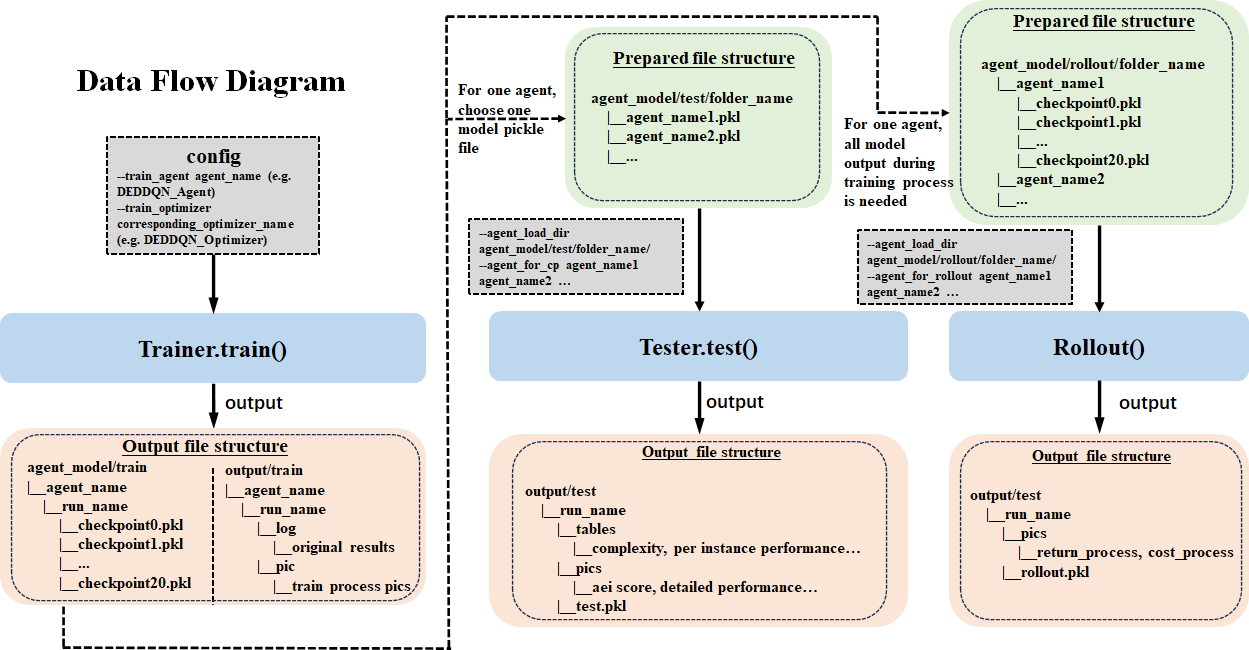MetaBox
MetaBox: A Benchmark Platform for Meta-Black-Box Optimization with Reinforcement Learning
MetaBox is the first benchmark platform expressly tailored for developing and evaluating MetaBBO-RL methods. MetaBox offers a flexible algorithmic template that allows users to effortlessly implement their unique designs within the platform. Moreover, it provides a broad spectrum of over 300 problem instances, collected from synthetic to realistic scenarios, and an extensive library of 19 baseline methods, including both traditional black-box optimizers and recent MetaBBO-RL methods. Besides, MetaBox introduces three standardized performance metrics, enabling a more thorough assessment of the methods. The github repos can be referred here and the paper can be found here.
Overview

MetaBox can be divided into six modules: Template, Test suites, Baseline Library, Trainer, Tester and Logger.
Templatecomprises two main components: the meta-level RL agent and the lower-level optimizer, which provides a unified interface protocol for users to develop their own MetaBBO-RL with ease.Test suitesare used for generating training and testing sets, including Synthetic, Noisy-Synthetic, and Protein-Docking.Baseline Librarycomprises proposed algorithms including MetaBBO-RL, MetaBBO-SL and classic optimizers that we implemented for comparison study.Trainermanages the entire learning process of the agent by building environments consisting of a backbone optimizer and a problem sampled from train set and letting the agent interact with environments sequentially.Testeris used to evaluate the optimization performance of the MetaBBO-RL. By using the test set to test the baselines and the trained MetaBBO agent, it produces test log for logger to generate statistic test results.Loggerimplements multiple interfaces for displaying the logs of the training process and the results of the testing process, which facilitates the improvement of the training process and the observation of MetaBBO-RL’s performance.
Data Stream

When using MetaBox, after the training interface Trainer.train() called, 21 pickle files of training agent in different training process and pictures of training process will be output to src/agent_model/train and src/output/train respectively. If you want to compare performance among baselines built-in or your own approach, Tester.test is needed to be called. For those learnable agent in your comparing list, you need to first collect these agent model pickle files (one agent one file) to a specific folder, where the agent model file may have been outputed by Trainer.train() and you can find that and then copy it to the right place. When Tester.test() finished, tables containing per-instance result and algorithm complexity, pictures depicting comparison results or singal approach performance, original testing result will be output to src/output/test. In addition, for Rollout interface, before that you need to collect all of checkpoints of all of learning agents which can be copy from output of Trainer.train(). When Rollout finished, pictures containing average return process and optimization cost process will be output to src/output/rollout and the original data file will also be saved.
Datasets and Baselines
Basic Tutorials
Citing MetaBox
If you find our MetaBox useful, please cite it in your publications or projects.
@inproceedings{metabox,
author={Ma, Zeyuan and Guo, Hongshu and Chen, Jiacheng and Li, Zhenrui and Peng, Guojun and Gong, Yue-Jiao and Ma, Yining and Cao, Zhiguang},
title={MetaBox: A Benchmark Platform for Meta-Black-Box Optimization with Reinforcement Learning},
booktitle = {Advances in Neural Information Processing Systems},
year={2023},
volume = {36}
}
Acknowledgements
The code and the framework are based on the repos DEAP, coco and Protein-protein docking V4.0.